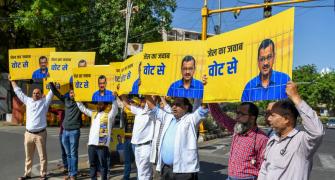Jiten Kumar, 30, a stage actor, bought a Rs 1 crore (Rs 10 million) endowment plan for a 15-year term from OM Kotak Mahindra.
Since most actors tend to have short careers, Kumar decided to shorten the premium paying term since he could not be sure he would earn a fat salary for the next 15 years.
This is possible as many insurance firms offer limited premium payment options.
Today, Kumar regrets his decision to shorten the premium paying term. He is also deliberating on switching to another scheme, since his annual premium outgo for the next three years disqualifies him from receiving any tax benefits.
The Finance Bill, 2003, has done away with tax benefits under section 10 (10D) of the I-T Act on sums received under an insurance policy where the premium paid in any of the years during the term of the cover exceeds 20 per cent of the actual capital sum assured.
Shirin Mehta, who received a good sum when she opted for voluntary retirement from the Central Bank of India. She invested a sizeable amount in SBI Life's Young Sanjeevan - a single premium cover.
She took a Rs 500,000 cover for a premium of Rs 346,000. She was attracted by the fact that she would get Rs 100,000 every year after the 5th year, and still continue to be insured for the full 10 years.
Today, she is apprehensive about the possibility that the regular assured returns will be taxed every year at the then prevailing tax rate. When she bought the cover, it was on the assumption that she would get tax-free returns.
A host of State Bank of India employees who opted for VRS took SBI Life's Sanjeevan cover last year.
Fifty-six year old Shirish Parekh paid a single premium of Rs 242,000 to enjoy a life cover of Rs 500,000.
He opted for a plan which would offer him a survival benefit of Rs 35,000 every year for 10 years after the age of 61.
At the same time, he also enjoys life cover during the 10-year term. Parekh, though, has read the Finance Bill, for he expects the insurance company to honour its word.
His policy reads: "The survival benefit payment, bonuses and claims are tax-free in your hands and in the hands of your nominee."
Many policyholders are today in a dilemma, wondering whether or not to surrender large-premium policies. Shirin and Kumar - whose policies are not even 2 years old - are in a Catch 22 situation.
Should they decide to surrender their policies, they fear that they may have to pay tax for the rebate they enjoyed in the last fiscal under section 88 when they took their respective covers.
There is a 2-year lock-in period for tax assesses who want to enjoy section 88 benefits. But at the same time, they also fear that should they continue with their covers, they would end up losing substantial returns as not all insurance covers are tax-free.
Shirin, Kumar and Parekh - like many other policyholders - have invested in insurance products for the sake of enjoying assured rates of return - without attracting taxes.
The Life Insurance Corporation attracted Rs 5,500 crore (Rs 55 billion) in first premium income from Bima Nivesh (a single premium policy) last year alone.
The scheme guarantees returns ranging from 9.3 per cent to 9.7 per cent, depending on the term of the coverage.
If the premium paid enjoyed tax benefits under section 88 and the returns on maturity were tax-free, the actual yield to the investor worked out as high as 15 per cent.
With tax exemptions withdrawn, and proceeds being fully taxable, policyholders can only look forward to returns akin to that offered in fixed deposit schemes - at a little over six per cent. Real returns to investors will be very low.
Watch Jaswant's lips
The Finance Bill, 2003, makes insurance products less attractive and single premium plans may well be on the road to early death.
But since the insurance companies will be lobbying hard to retain a scheme that has yielded them rich pickings, it is not yet time to call it quits.
Watch out for any concession from Jaswant Singh before you finally throw in the towel.






